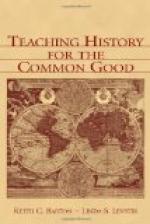The assignment of advance questions such as have been suggested possesses several advantages. It makes it possible for the teacher to hold the class responsible for definite preparation, very much as the teacher in algebra is able to do with the problems assigned in advance. It forces the students to do most of the talking. It encourages an intelligent use of the library in a manner calculated to develop the student’s powers of investigation. If the pupil forgets most of his history, but retains the ability to investigate carefully, thoroughly, and critically, the plan has more than justified itself. The plan enables the teacher to spend his time in explanation of what the pupil has been unable to do for herself, and thus effects a considerable saving in time. It would be interesting to secure a statement of how much of the teacher’s time is ordinarily spent in doing for the student in recitation what he should have done for himself before coming to class. It substitutes for the pupil’s snap judgment, given without much thought and too frequently influenced by the inflection of the teacher’s voice, an opinion that has resulted from research and deliberation unbiased by the teacher’s personal views.
It is too much to expect high school pupils to solve historical problems extemporaneously. If inferences and contrasts other than those given in the text are to be drawn, if statements are to be defended or opposed, the high school student should be given time to prepare his answer. Aside from the injustice of any other procedure, it is a hopeless waste of time to spend the precious minutes of the recitation in gathering negative replies and worthless judgments.
Methods of preparing questions assigned in advance
It may be urged that such an assignment of a lesson as that proposed is too ambitious and that it exacts too much of the teacher’s time. In answer it should be said that specialists in history ought surely to have read widely enough and studied deeply enough to be able to select intelligent questions of the sort suggested. We have assumed that the teacher has made adequate preparation for his work. Certainly, then, he should be ready to explain the social, geographical, and economic relation of the events mentioned in the lesson. He should know their bearing on current history. He should always have ready a fund of information, additional to that given in the text. In preparing advance questions for distribution to the class the teacher is preparing his own lesson. He may be doing it a day or two earlier than he would otherwise do, but surely he is performing no labor additional to what may reasonably be expected of him. As to the time required to prepare copies of the questions for distribution when the class convenes, it may be said that a neostyle or mimeograph, with which all large schools and many small ones are equipped, makes short work of preparing as many copies of the questions as desired. If




